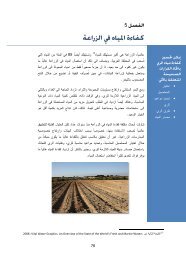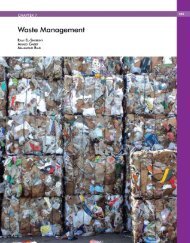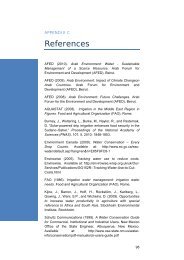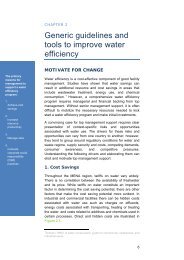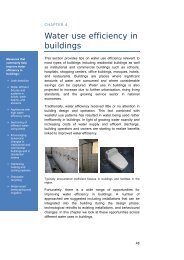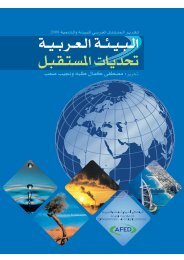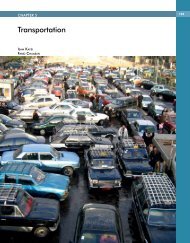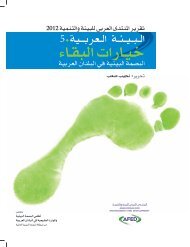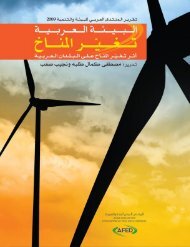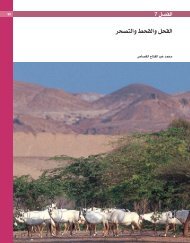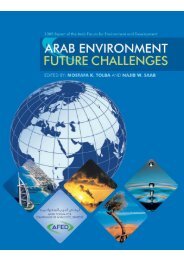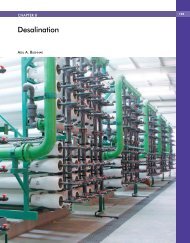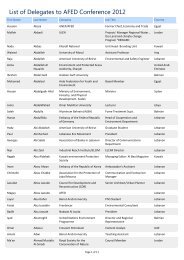Impact of Climate Change on Arab Countries - (IPCC) - Working ...
Impact of Climate Change on Arab Countries - (IPCC) - Working ...
Impact of Climate Change on Arab Countries - (IPCC) - Working ...
You also want an ePaper? Increase the reach of your titles
YUMPU automatically turns print PDFs into web optimized ePapers that Google loves.
20<br />
CHAPTER 2<br />
GHG EMISSIONS: MITIGATION EFFORTS IN THE ARAB COUNTRIES<br />
Measures to reduce GHG emissi<strong>on</strong>s and improve<br />
energy efficiency reported through the first<br />
nati<strong>on</strong>al communicati<strong>on</strong> include efficient<br />
motors, combusti<strong>on</strong> efficiency improvements <str<strong>on</strong>g>of</str<strong>on</strong>g><br />
boilers and furnaces, and improve efficiency <str<strong>on</strong>g>of</str<strong>on</strong>g><br />
the cement industry. As the cement industry is<br />
the single largest source <str<strong>on</strong>g>of</str<strong>on</strong>g> Lebanese CO 2 emissi<strong>on</strong>s<br />
and a major energy user, mitigati<strong>on</strong> measures<br />
reported included process modificati<strong>on</strong> and<br />
combusti<strong>on</strong> efficiency improvements (Leban<strong>on</strong>,<br />
1999).<br />
The Building Sector<br />
MASDAR CITY<br />
A pi<strong>on</strong>eering initiative in the UAE is the c<strong>on</strong>structi<strong>on</strong> <str<strong>on</strong>g>of</str<strong>on</strong>g> the<br />
world’s first zero-carb<strong>on</strong>, zero-waste and car-free-city in Abu<br />
Dhabi, named MASDAR city. The city is planned to host<br />
40,000 residents and receive another 50,000 daily commuters.<br />
It is envisi<strong>on</strong>ed to be a free z<strong>on</strong>e clean-tech cluster<br />
home to around 1,500 visi<strong>on</strong>ary companies and research<br />
centres. The MASDAR Institute <str<strong>on</strong>g>of</str<strong>on</strong>g> Science and Technology is<br />
the first comer to the city and will be home to 100 students<br />
and faculty by fall 2009. Cars will be banned within the city;<br />
travel will be accomplished via public mass transit and pers<strong>on</strong>al<br />
rapid transit systems, with road and railways c<strong>on</strong>necting<br />
commuters to other locati<strong>on</strong>s outside the city. The city will be<br />
walled, to keep out the hot desert wind. The lack <str<strong>on</strong>g>of</str<strong>on</strong>g> cars will<br />
allow for narrow, shaded streets that will also improve air circulati<strong>on</strong><br />
and reduce demand for air c<strong>on</strong>diti<strong>on</strong>ing. The city will<br />
be oriented northeast to minimize the amount <str<strong>on</strong>g>of</str<strong>on</strong>g> direct sunlight<br />
<strong>on</strong> buildings’ sides and windows. Solar panels and solar<br />
collectors <strong>on</strong> ro<str<strong>on</strong>g>of</str<strong>on</strong>g>s and elsewhere will generate enough electricity<br />
to meet most <str<strong>on</strong>g>of</str<strong>on</strong>g> the city’s electricity needs. Water will be<br />
provided through a solar-powered desalinati<strong>on</strong> plant.<br />
Landscaping within the city and crops grown outside the city<br />
will be irrigated with grey water and treated waste water produced<br />
by the city. It is planned that MASDAR City will be completed<br />
and be fully functi<strong>on</strong>al by 2012 (The Ec<strong>on</strong>omist,<br />
2008). Recently, MASDAR City was elected to host the newly<br />
established Internati<strong>on</strong>al Renewable Energy Agency (IRENA);<br />
this is a milest<strong>on</strong>e achievement for Abu Dhabi and marks the<br />
first time that an <strong>Arab</strong> city plays host to the headquarters <str<strong>on</strong>g>of</str<strong>on</strong>g> an<br />
internati<strong>on</strong>al organizati<strong>on</strong> (MASDAR, 2009)<br />
Sources: The Ec<strong>on</strong>omist (2008). MASDAR Plan.<br />
At http://www.ec<strong>on</strong>omist.com/science/tq/displaystory.cfmstory_id=12673433<br />
MASDAR (2009), http://www.irenauae.com/en/home/index.aspx<br />
Energy use in buildings accounts for nearly 40%<br />
<str<strong>on</strong>g>of</str<strong>on</strong>g> global energy c<strong>on</strong>sumpti<strong>on</strong> and 36% <str<strong>on</strong>g>of</str<strong>on</strong>g> total<br />
energy-related CO 2 emissi<strong>on</strong>s. Half <str<strong>on</strong>g>of</str<strong>on</strong>g> this energy<br />
c<strong>on</strong>sumpti<strong>on</strong> occurs in industrialized countries,<br />
the remainder is c<strong>on</strong>sumed by the rest <str<strong>on</strong>g>of</str<strong>on</strong>g><br />
the world (Price et al., 2005). In general, two<br />
major strategies have been used to improve energy<br />
efficiency in the building sector and thus<br />
reduce its GHG emissi<strong>on</strong>s. The first strategy is to<br />
improve building envelope energy performance.<br />
This is widely known as green building, sustainable<br />
building or energy efficient building c<strong>on</strong>cepts.<br />
The sec<strong>on</strong>d strategy is to improve efficiency<br />
<str<strong>on</strong>g>of</str<strong>on</strong>g> energy c<strong>on</strong>suming equipment used inside<br />
the buildings such as home appliances, lighting<br />
systems, air c<strong>on</strong>diti<strong>on</strong>ing systems, computers and<br />
other <str<strong>on</strong>g>of</str<strong>on</strong>g>fice equipments and the like.<br />
In resp<strong>on</strong>se to recent envir<strong>on</strong>mental, ec<strong>on</strong>omic,<br />
market and regulatory drivers, green building<br />
c<strong>on</strong>cepts and practices have become widely promoted<br />
worldwide. The U.S. Green Building<br />
Council has developed a Green Building Rating<br />
System called the Leadership in Energy and<br />
Envir<strong>on</strong>mental Design (LEED). Today, there are<br />
more than 50,000 LEED-accredited pr<str<strong>on</strong>g>of</str<strong>on</strong>g>essi<strong>on</strong>als<br />
in the US. Furthermore, the World Green<br />
Building Council (GBC) is a uni<strong>on</strong> <str<strong>on</strong>g>of</str<strong>on</strong>g> nati<strong>on</strong>al<br />
councils. The current member nati<strong>on</strong>s <str<strong>on</strong>g>of</str<strong>on</strong>g> the<br />
World GBC represent over 50 percent <str<strong>on</strong>g>of</str<strong>on</strong>g> global<br />
c<strong>on</strong>structi<strong>on</strong> activity, and touch more than<br />
15,000 companies and organizati<strong>on</strong>s worldwide<br />
(USGBC, 2008).<br />
The UAE is pi<strong>on</strong>eering to apply the LEED certificati<strong>on</strong><br />
system in new buildings, and in 2005<br />
established the Emirates Green Building<br />
Council, meant to become a model for the <strong>Arab</strong><br />
regi<strong>on</strong> to follow (Emirates GBC, 2008). Bahrain<br />
is also working towards achieving the same goal.<br />
Several other <strong>Arab</strong> countries have similarly been<br />
developing energy building codes.<br />
Many <strong>Arab</strong> countries have already established<br />
different kinds <str<strong>on</strong>g>of</str<strong>on</strong>g> building codes. As part <str<strong>on</strong>g>of</str<strong>on</strong>g> the<br />
nati<strong>on</strong>al energy efficiency strategy <str<strong>on</strong>g>of</str<strong>on</strong>g> Jordan,<br />
thermal insulati<strong>on</strong> in residential and commercial<br />
building in certain z<strong>on</strong>ing areas should be<br />
enforced. In additi<strong>on</strong>, the preparati<strong>on</strong> <str<strong>on</strong>g>of</str<strong>on</strong>g> an<br />
“Energy Efficiency Code” is a part <str<strong>on</strong>g>of</str<strong>on</strong>g> such a strategy<br />
(Shahin, 2005).<br />
After many efforts to promote green architecture<br />
by several Egyptian instituti<strong>on</strong>s, Egypt developed<br />
residential building energy efficiency codes in<br />
2003, and the new codes will be initially imple-



